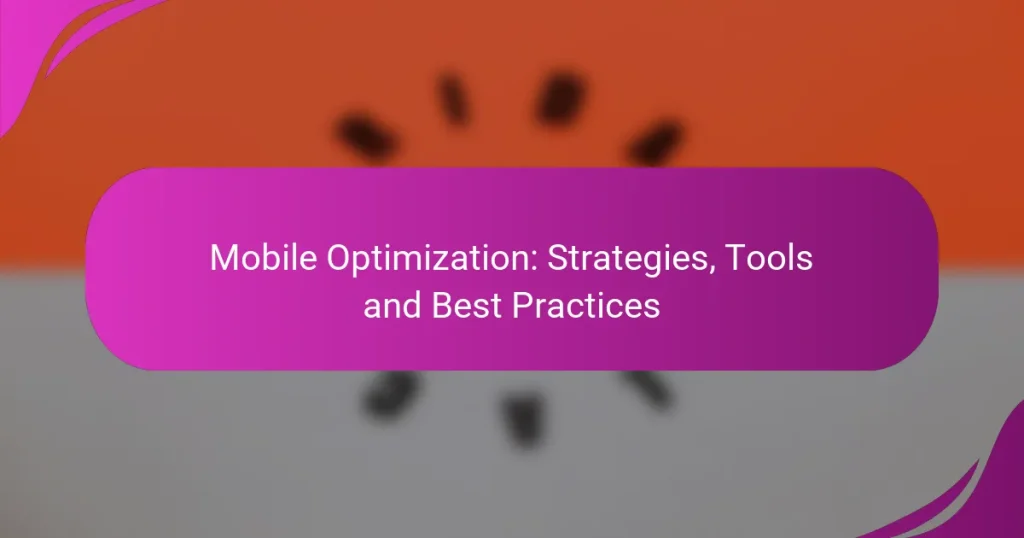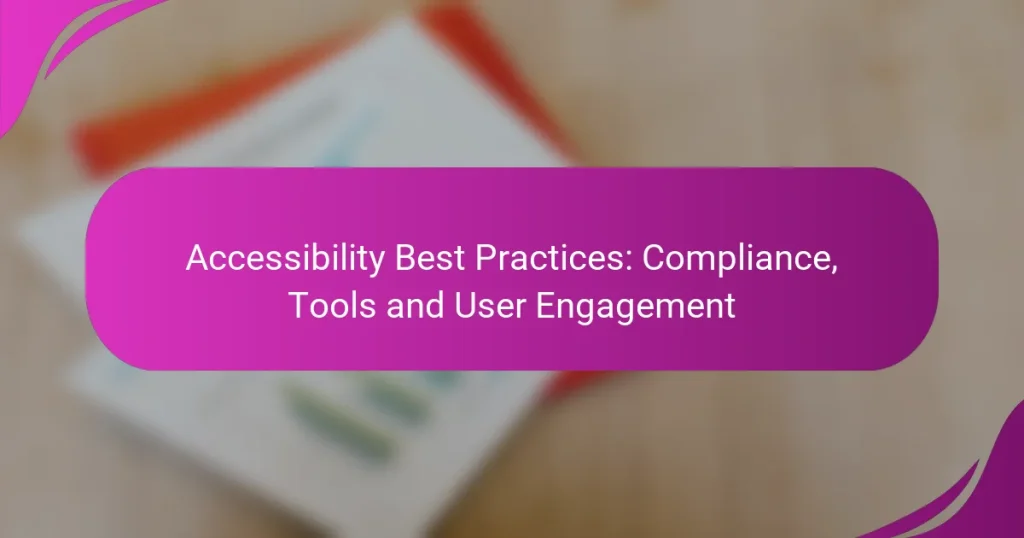Digital marketing services focused on website optimization are essential for businesses looking to enhance their online presence. By implementing effective techniques such as on-page SEO, content optimization, and local SEO, companies can improve visibility, user experience, and conversion rates. Utilizing SEO tools further aids in identifying areas for improvement and tracking progress, ensuring that businesses remain competitive in the digital landscape.
User Behavior Analysis: Tools, Metrics and Insights
Website Load Speed: Tools, Techniques and Benefits
Accessibility Best Practices: Compliance, Tools and User Engagement
SEO and UX: Integration, Benefits and Impact on Rankings
A/B Testing: Elements, Strategies and Conversion Improvement
User Experience Design: Principles, Benefits and Techniques
What are effective website optimization techniques in South Africa?
Effective website optimization techniques in South Africa focus on enhancing visibility, improving user experience, and increasing conversion rates. These techniques encompass various strategies, including on-page SEO, technical improvements, content optimization, user experience enhancements, and mobile optimization practices.
On-page SEO strategies
On-page SEO strategies involve optimizing individual web pages to rank higher and earn more relevant traffic. Key elements include using targeted keywords in titles, headings, and meta descriptions, as well as ensuring proper use of header tags and alt text for images.
In South Africa, it’s crucial to consider local search terms and phrases that potential customers might use. Tools like Google Keyword Planner can help identify these keywords and guide content creation.
Technical SEO improvements
Technical SEO improvements focus on the backend structure of a website to enhance its performance and crawlability. This includes optimizing site speed, ensuring mobile-friendliness, and creating an XML sitemap to help search engines index the site effectively.
In South Africa, website loading times should ideally be under three seconds to reduce bounce rates. Regularly checking for broken links and ensuring proper redirects can also improve the technical health of a site.
Content optimization methods
Content optimization methods aim to enhance the quality and relevance of website content. This involves creating high-quality, informative, and engaging content that addresses the needs of the target audience.
Incorporating local insights and examples can make content more relatable to South African users. Regularly updating content and using internal linking strategies can also boost SEO performance.
User experience enhancements
User experience enhancements focus on making a website more intuitive and enjoyable for visitors. This includes improving site navigation, ensuring a clean layout, and providing clear calls to action.
In South Africa, understanding cultural preferences can help tailor the user experience. Conducting user testing can provide valuable feedback on how to improve site usability.
Mobile optimization practices
Mobile optimization practices ensure that a website functions well on mobile devices, which is increasingly important as mobile traffic grows. This includes responsive design, fast loading times, and easy-to-click buttons.
In South Africa, where mobile internet usage is high, it’s essential to prioritize mobile optimization. Tools like Google’s Mobile-Friendly Test can help assess a website’s mobile compatibility and identify areas for improvement.
How can SEO tools improve website optimization?
SEO tools enhance website optimization by providing insights into keyword performance, backlink profiles, and overall site analytics. These tools help identify areas for improvement, track progress, and inform strategic decisions to boost search engine rankings.
SEMrush for keyword analysis
SEMrush is a powerful tool for conducting keyword analysis, allowing users to discover high-traffic keywords relevant to their niche. It provides data on search volume, keyword difficulty, and competitive density, enabling marketers to select the most effective keywords for their content strategy.
To maximize SEMrush’s potential, focus on long-tail keywords that have lower competition but still attract significant traffic. Regularly update your keyword list based on seasonal trends and emerging topics to stay ahead of competitors.
Ahrefs for backlink tracking
Ahrefs excels in backlink tracking, offering comprehensive insights into your website’s link profile and that of your competitors. Understanding your backlinks helps identify opportunities for link building and enhances your site’s authority in search engines.
Utilize Ahrefs to analyze the quality and relevance of your backlinks. Aim to acquire links from high-authority sites within your industry, and regularly audit your link profile to remove any toxic links that could harm your SEO performance.
Google Analytics for performance monitoring
Google Analytics is essential for performance monitoring, providing detailed insights into user behavior, traffic sources, and conversion rates. By analyzing this data, you can identify which pages perform well and which need improvement.
Set up goals in Google Analytics to track conversions effectively. Regularly review metrics such as bounce rate and average session duration to gauge user engagement, and adjust your content strategy accordingly to enhance user experience and retention.
What role does local SEO play in website optimization?
Local SEO is crucial for website optimization as it enhances visibility in local search results, helping businesses attract nearby customers. By optimizing for local search, companies can improve their chances of being found by users searching for services or products in their area.
Google My Business optimization
Optimizing your Google My Business (GMB) listing is essential for local SEO. Ensure that your business name, address, and phone number (NAP) are accurate and consistent across all platforms. Regularly update your GMB profile with current information, photos, and posts to engage potential customers.
Consider adding attributes that highlight your services, such as “outdoor seating” or “wheelchair accessible.” This helps potential customers quickly understand what you offer and increases the likelihood of visits.
Local keyword targeting
Local keyword targeting involves using specific phrases that reflect your geographic area in your website content. Incorporate keywords like “best coffee shop in [City]” or “plumbing services near me” to improve your search rankings. Tools like Google Keyword Planner can help identify effective local keywords.
Focus on long-tail keywords that are more specific and less competitive. These often lead to higher conversion rates as they target users with clear intent to purchase or engage with your services.
Customer reviews and ratings
Customer reviews and ratings significantly impact local SEO by influencing search rankings and consumer trust. Encourage satisfied customers to leave positive reviews on platforms like Google and Yelp. Responding to reviews, both positive and negative, shows that you value customer feedback.
Monitor your online reputation regularly. Aim for a high average rating, ideally above 4 stars, as this can enhance your credibility and attract more local customers. Consider implementing a follow-up system to request reviews after a purchase or service completion.
What are the prerequisites for effective website optimization?
Effective website optimization requires a clear understanding of your target audience, a thorough analysis of competitors, and well-defined goals. These elements ensure that your optimization efforts are focused and impactful.
Understanding target audience
Identifying your target audience is crucial for effective website optimization. This involves researching demographics, preferences, and behaviors to tailor your content and design accordingly. Use tools like Google Analytics and social media insights to gather data on who visits your site.
Once you know your audience, create user personas to visualize their needs and motivations. This helps in crafting relevant content that resonates with them, ultimately improving engagement and conversion rates.
Competitor analysis
Analyzing competitors provides valuable insights into what works in your industry. Identify key competitors and evaluate their websites for strengths and weaknesses, focusing on aspects like design, content, and user experience. Tools such as SEMrush or Ahrefs can help you assess their SEO strategies and traffic sources.
Look for gaps in their offerings that you can exploit. For instance, if a competitor lacks a mobile-friendly design, ensuring your site is optimized for mobile can give you a competitive edge.
Setting clear goals
Establishing clear goals is essential for measuring the success of your website optimization efforts. Goals should be specific, measurable, achievable, relevant, and time-bound (SMART). For example, aim to increase organic traffic by a certain percentage within a specific timeframe.
Regularly review and adjust your goals based on performance data. This ensures that your optimization strategies remain aligned with your business objectives and market conditions, allowing for continuous improvement.
How to choose the right digital marketing services for optimization?
Choosing the right digital marketing services for optimization involves assessing your specific needs and the expertise of potential providers. Focus on their track record, service offerings, and alignment with your business goals to ensure effective website optimization.
Evaluating service provider expertise
When evaluating the expertise of a digital marketing service provider, consider their experience in website optimization and the results they have achieved for previous clients. Look for providers that specialize in your industry, as they will have a better understanding of your target audience and market dynamics.
Review case studies and client testimonials to gauge their success rates. A strong portfolio showcasing diverse optimization techniques, such as SEO, A/B testing, and user experience improvements, can indicate a provider’s capability to enhance your website effectively.
Additionally, inquire about their certifications and ongoing education in digital marketing trends. Providers who stay updated with the latest tools and strategies are more likely to deliver innovative solutions that keep your website competitive in the digital landscape.





